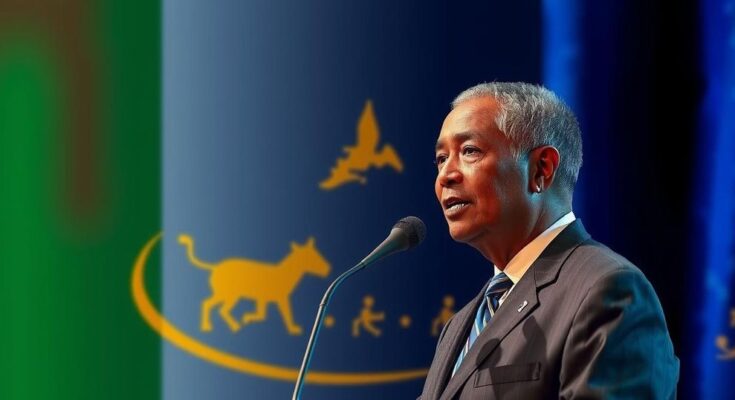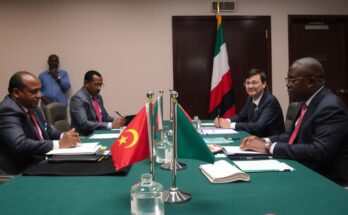Sudan’s President Omar al-Bashir has canceled his visit to Indonesia for the Asia-African leaders conference at the last minute. Citing the need to monitor post-election affairs, his absence comes amid ongoing pressures from rights groups regarding his arrest due to ICC warrants. Sudan’s foreign affairs minister will head the delegation instead, signaling al-Bashir’s continuing limitations in international travel.
Sudan’s President Omar Hassan al-Bashir has abruptly canceled his planned visit to Indonesia, where he was set to attend the Asia-African leaders conference commencing on Wednesday. This event would have marked his first trip outside of Africa or the Middle East in nearly four years. According to Sudan’s foreign ministry spokesman, Ali al-Sadiq, the decision resulted from al-Bashir’s involvement in overseeing post-election activities within the country. Consequently, Sudan’s foreign affairs minister will lead the delegation at the summit in Jakarta.
The cancellation of President al-Bashir’s trip has drawn attention from human rights advocates, who previously expressed concern regarding his potential arrest due to an outstanding warrant from the International Criminal Court (ICC). The ICC accused him in 2009 of war crimes and crimes against humanity linked to the Darfur conflict. Though Indonesia is not a member of the ICC, the possibility of his arrest prompted significant protests.
Despite the missed opportunity to attend the conference, President al-Bashir has remained active in travel, primarily visiting non-ICC member nations, particularly within the Arab and African regions. His last notable trip beyond Africa or the Middle East occurred in June 2011 when he visited China. Rights groups have recognized this cancellation as a reinforcement of his status as a fugitive from international justice, limiting his travel options significantly.
The cancellation of President Omar al-Bashir’s planned visit is significant due to his international status, marked by an ICC warrant accusing him of serious crimes during the Darfur conflict. The situation highlights ongoing disputes regarding international accountability and justice. Rights organizations have been pressing for al-Bashir’s arrest during any international engagement, making his potential presence at the conference a contentious issue. Al-Bashir’s historical travel patterns mainly involve countries that are either non-ICC members or have refrained from arresting him despite existing warrants.
In summary, the late cancellation of President Omar al-Bashir’s trip to Indonesia underscores the continued challenges he faces regarding international justice and travel limitations. His status as a fugitive from the ICC remains a critical factor influencing diplomatic actions and gatherings, while his role in overseeing domestic post-election processes further complicates his travel plans.
Original Source: www.aljazeera.com




